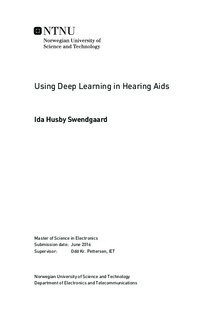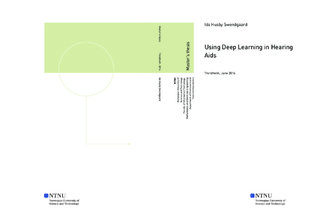| dc.description.abstract | The aim of this masters thesis is to investigate if deep neural networks and deep learning can work as an alternative for existing hearing aids. Traditional hearing aids are limited to compensate for attenuation losses and do not seem to work for losses containing distortion. As deep learning has successfully been used for other speech related tasks such as speech-in-noise and speech recognition, it seems natural to look at the use of deep learning also in hearing aids. Maybe deep neural networks can be trained to pre-compensate for more complex losses than the ones being covered by today's hearing aids.
The work done in this thesis includes setting up a complete system including a deep neural network and a hearing loss simulator in addition to some more general signal processing blocks. First the system is trained without any hearing loss in order to obtain an optimized system for the speech data. Then, some simple hearing losses are applied such as damping, expansion and quantization.
As a hearing loss will be applied after any hearing aid, information that is lost will not be possible to restore using pre-compensation. The results shows that the deep neural network can be trained to compensate for both damping and expansion, but as expected it does not work when the hearing loss contains quantization, that is, loss. The system is not tested for more complex hearing losses, thus this should be done in order to further study the true effect of using deep learning in hearing aids. Designing functions for complex hearing losses is the most challenging task that remains to be done. When such an advanced hearing loss simulator is obtained, the system must be trained using this loss in order to see if it is capable of learning in a satisfactory way. | |

